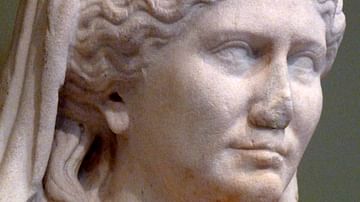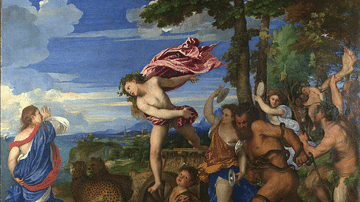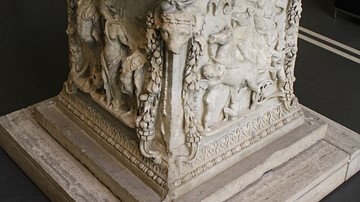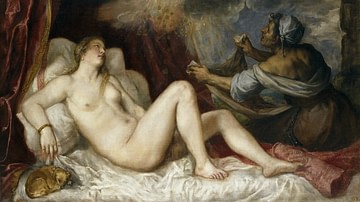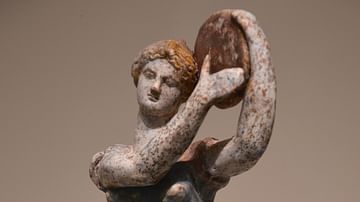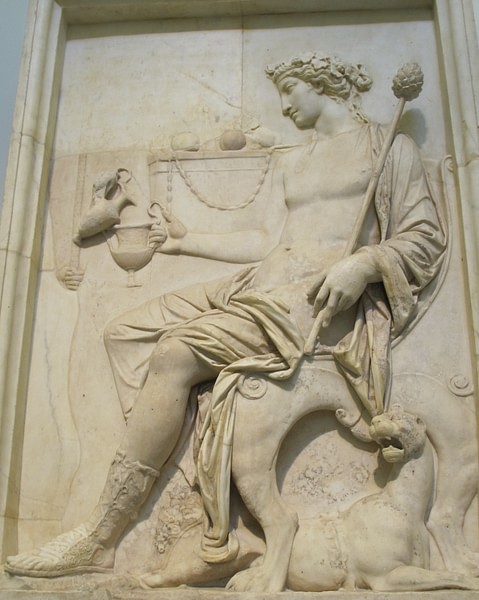
Bacchus was the god of wine and revelry in Roman mythology. Considered the most versatile and elusive of the gods, with a Greek equivalent in Dionysus, Bacchus is frequently associated with the Roman god of wine Liber Pater. He brought joy wherever he went, but if crossed, he could be a vengeful god, driving one into madness.
Birth
Bacchus was the son of Jupiter and the mortal Semele, daughter of Cadmus (king of Phoenicia) and Concordia (Harmonia), the goddess of harmony. Jupiter had visited Semele nightly in disguise since a mortal cannot see a god in their divine form. The always jealous Juno, well aware of her husband's wandering eye and infidelities, visited the pregnant Semele disguised as her old nurse Beroe. Semele told 'Beroe' about all of Jupiter's visits and his personal charm. Juno informed Semele that her visitor was not Jupiter, but an imposter. To be sure, on Jupiter's next visit, Semele persuaded him to return to her, not in disguise, but in all of his "power and glory". Reluctantly, Jupiter agreed and returned "accompanied by thunder and lightning." Semele, upon seeing him in his divine form, fell to the floor and was instantly consumed by fire. Her palace was reduced to ashes. Jupiter was able to save her unborn child by attaching him to his thigh. The Greek poet Hesiod in his Theogony only makes a brief reference to the child's birth: "Semele, Cadmus' daughter, lay with Zeus and bore him a brilliant son, a god, glad Dionysus, mortal though she was, and now they both have joined the ranks of gods" (54).
With Juno still fuming and seeking vengeance over Jupiter's affair, the little baby Bacchus was not out of danger. Bacchus was entrusted to Mercury, who in turn gave the infant to Ino, sister of Semele and wife of Athamas, a Boeotian king; however, Ino would not be allowed to care for the infant very long. Having learned of the infant's location, Juno made plans to punish Ino and her husband. She was angry with Bacchus' aunt because she had taken the child to raise with her own two sons.
Traveling to the underworld, Juno sought the help of one of the Furies, Tisiphone. Leaving the underworld, Tisiphone stood in the doorway of Ino's palace blocking their exit. Seeing the hideous Tisiphone and her head of snakes, Ino and her husband were stricken with terror. Unable to escape the sight of the mass of writhing snakes, Athamas sank into madness, his imagination ran wild, and he killed one of his sons, Learchus. The tearful Ino took her second son, Melicertes, and committed suicide by jumping into the sea. Pitying her and her son, the gods changed her into the goddess Leucothea while her son became the sea deity, Palaemon. In his Homeric Hymns, the Greek poet Homer spoke to Dionysus (Bacchus) of his birth:
That pregnant Semele bore you to Zeus whom thunder delights; yet others, lord, state that your birth was at Thebes – but all that they say is false. You were borne by the father of men and gods himself, remote from human, in secret from Hera… (3)
Travels
After the death of Ino, Bacchus was entrusted to the care of the Nysiades, nymphs of Mount Nysa. It was at Nysa that the satyr (half-man/half-goat) Silenus became his guardian; he educated Bacchus and accompanied him throughout his travels. According to historian E. M. Berens in his book Mythology, Bacchus was perceived "as a youth of singular beauty, with a somewhat effeminate appearance, the expression of his countenance is gentle and winning" – "the personification of nature" (61).
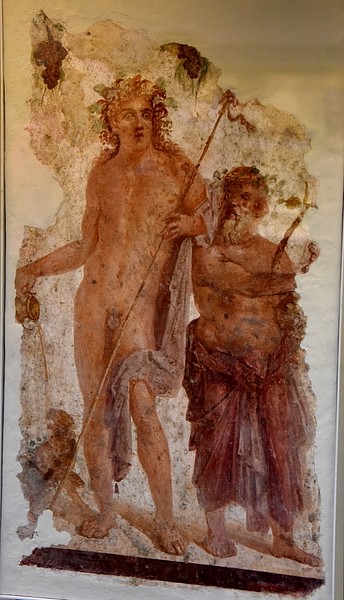
As the young god grew into manhood, he discovered the vine. It is believed that he invented the art of making wine. After seeing how people enjoyed his wine, Bacchus traveled the Mediterranean and as far east as Syria, Egypt, Arabia, and India, planting vines and teaching its cultivation. Often seen riding a panther, he carried a spear, the thyrsus, as his scepter and traveled in a chariot drawn by lions, tigers, panthers, and lynxes – all sacred to him.
Throughout his travels, Bacchus had his followers or revelers, some divine and some mortal. His mostly unruly female followers were referred to as Bacchantes. Unfortunately, his followers and their festivals, called bacchanals, were not well-received in many areas. In Rome, the cult of Bacchus grew secretive, going underground for a time, even its altars were ordered to be suppressed. Although Rome eventually accepted Bacchus' worship, this was not the case with Lycurgus of Thrace, who drove away Bacchus' attendants, the nymphs of Nysa. Normally calm, the god of wine and revelry could be vengeful and angry. He drove Lycurgus mad, so mad that he jumped into the sea, but, luckily for him, directly into the arms of the sea nymph Thetis. Although Lycurgus atoned for his conduct, Bacchus punished him with the loss of reason; he eventually killed one of his sons, Dryas.
Bacchus & the Pirates
One interesting myth surrounding Bacchus was his kidnapping by pirates. One day Tyrrhenian pirates spied the youthful Bacchus on shore attired in radiant garments. Thinking of the possible rewards for him, they seized him, brought him on board their ship, and bound him, planning to take him to Asia and sell him into slavery. Bacchus calmly asked to be put ashore, but the pirates only laughed and mocked him. Suddenly, the ship came to a complete standstill. The bounds fell off. The helmsman, believing he was seeing a god, tried to persuade the others to return Bacchus to the shore but to no avail. A giant vine grew out of the sea and wrapped itself around the mast and riggings. Music and the scent of wine filled the area. Realizing, belatedly, that they were in the presence of a god, the pirates begged to be allowed to return to shore. Bacchus changed into a lion and charged the men. They jumped into the sea where they all became dolphins.
The remaining helmsman surrendered Bacchus to the Naxos shore, where he found the abandoned and sleeping Ariadne. In the myth of the Minotaur, Ariadne was the beautiful daughter of the king of Crete who had been abandoned by the Greek hero Theseus after she had helped him defeat the half-man/half-bull. Bacchus was able to console her, and over time, he made her his wife. Unfortunately, she fell ill and died. The grieving Bacchus took little interest in music and dance until his father took pity and restored Ariadne to his side, making her immortal.
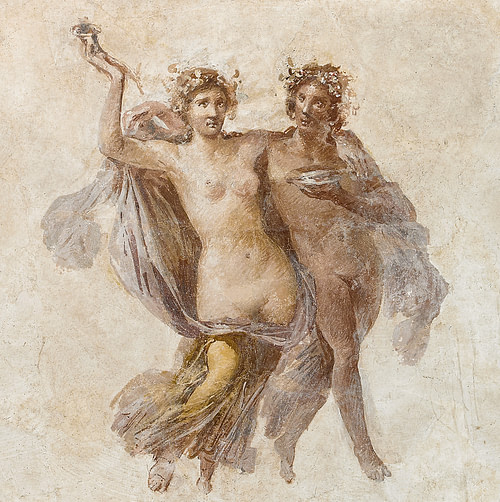
Midas & Pentheus
Another interesting myth concerning Bacchus is his relationship with King Midas of Phrygia. Silenus, having had a little too much of Bacchus' wine, strayed into the garden of the king. He was discovered asleep and escorted to Midas who treated him with kindness. After being led back to Bacchus, the grateful god promised the greedy Midas a single wish. Midas asked that everything he touched would be turned into gold. This 'Midas touch' worked for a while until the king became hungry but his plates, cup, drink, and even food all turned into gold. Realizing his dilemma, he returned to Bacchus and begged him to rescind the wish. The god told him to bathe in the river Pactolus. Doing so, Midas lost the touch.
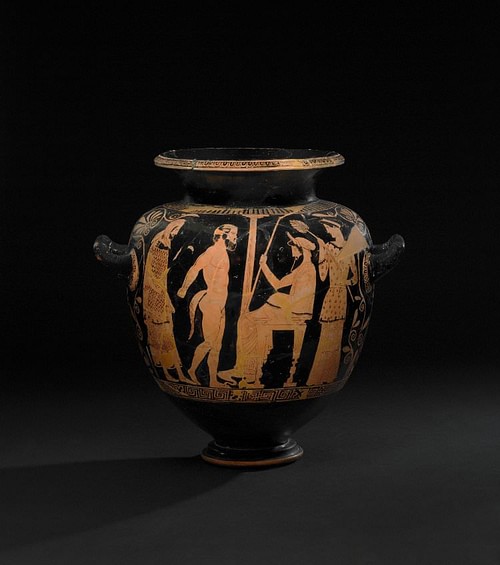
King Pentheus, like Lycurgus, wanted to keep the wine god far away from his city and its people. Bacchus and his followers sent a message to the king of Thebes announcing their arrival and asking for a suitable reception and entertainment. The king had heard of the disorder that accompanied Bacchus and told the wine god, in an insolent message, to stay outside the city gates. To avenge the insult, the annoyed god struck the women of Thebes with dementia, causing them to leave the city and join the religious rites, the Mysteries. Pentheus grew curious to see the rites for himself.
Ovid, in his Metamorphoses, called the king "the scoffer of gods." He laughed at the prophecy of an old seer who said: "Unless you worship as a god in his due, you shall be torn into a thousand pieces and scattered everywhere" (58). Still reluctant to accept Bacchus and his entourage, Pentheus listened to one of the revelers who had returned from the rites, "I have joined the rites and am one of the Bacchanalians …" (62). Pentheus grew angry: "You, slaves, now busy him away, rack his body with fearsome tortures, and so send him down to the Stygian nights" (62). Pentheus wanted to see the rites for himself. In disguise, he hid where he could watch without being seen; however, his hiding spot was exposed by his own mother, Agave; he was dragged out of his hiding place, and just as the prophecy predicted, Pentheus' arms were torn off.

